英语高中北师大版高二下选修模块7 Unit 20 New Frontiers课件
文档属性
| 名称 | 英语高中北师大版高二下选修模块7 Unit 20 New Frontiers课件 |  | |
| 格式 | zip | ||
| 文件大小 | 375.5KB | ||
| 资源类型 | 教案 | ||
| 版本资源 | 北师大版 | ||
| 科目 | 英语 | ||
| 更新时间 | 2013-04-08 23:01:11 | ||
图片预览


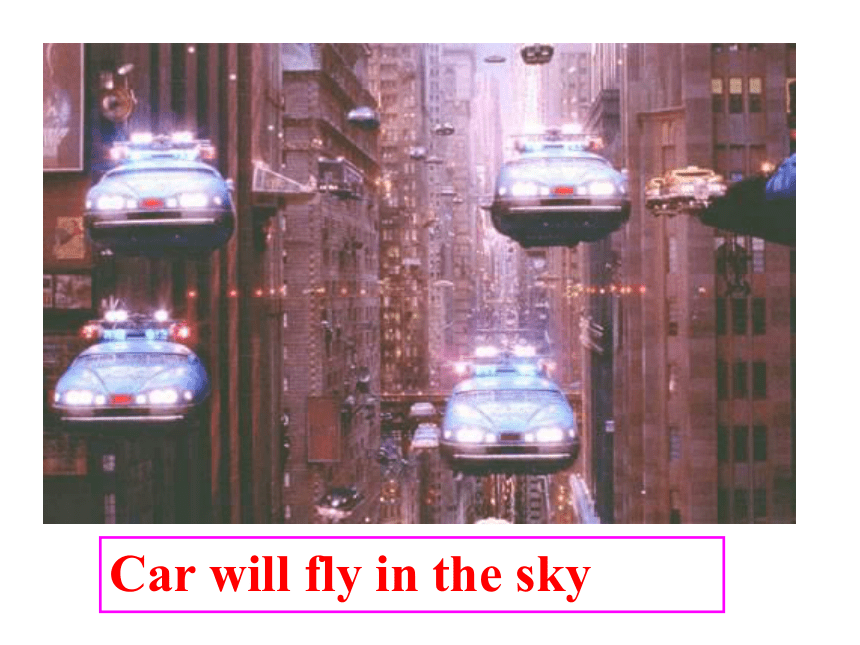



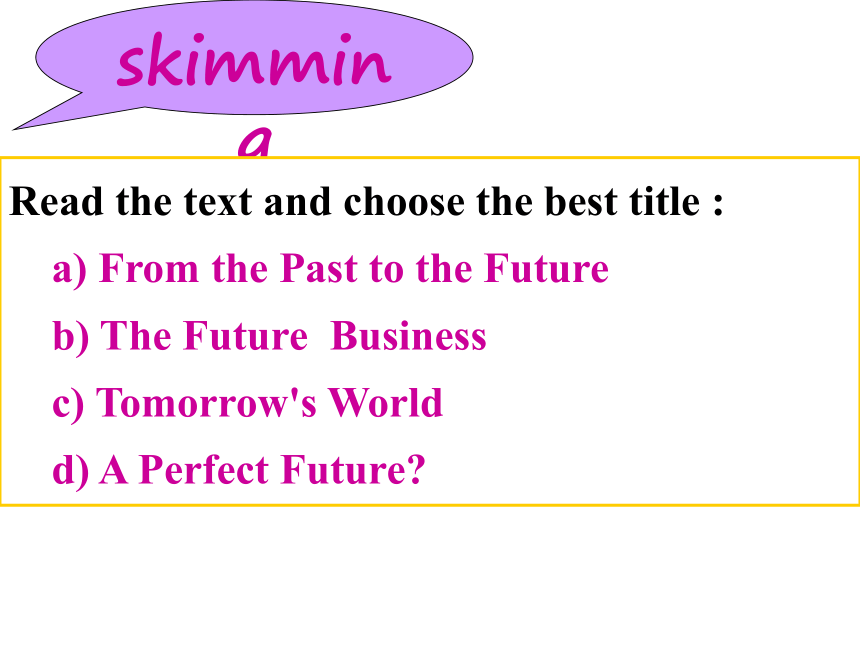

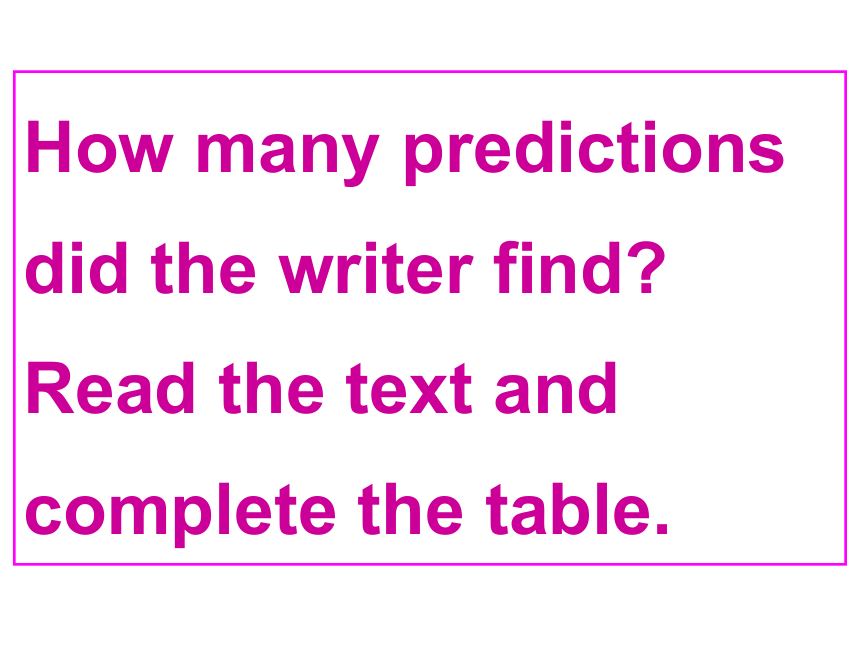
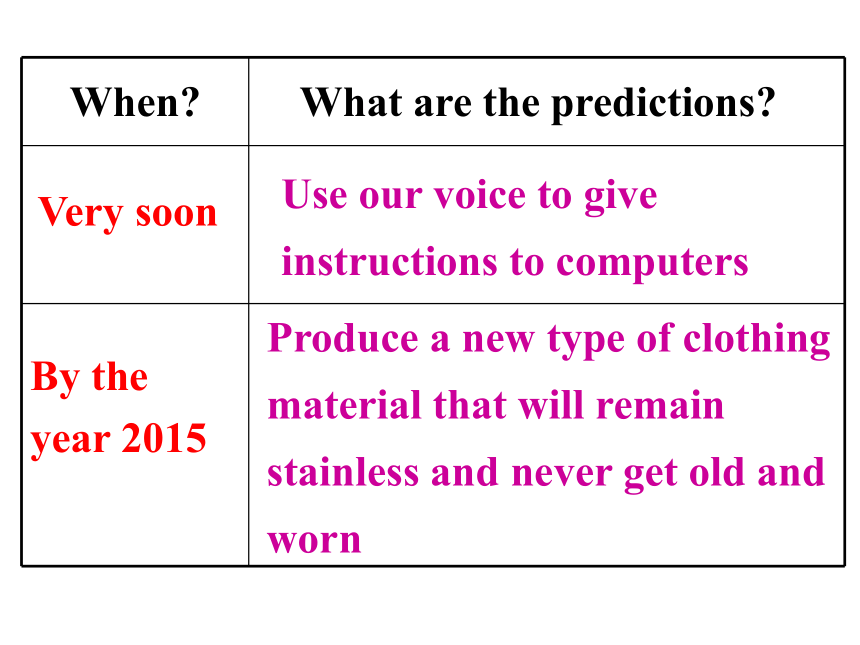
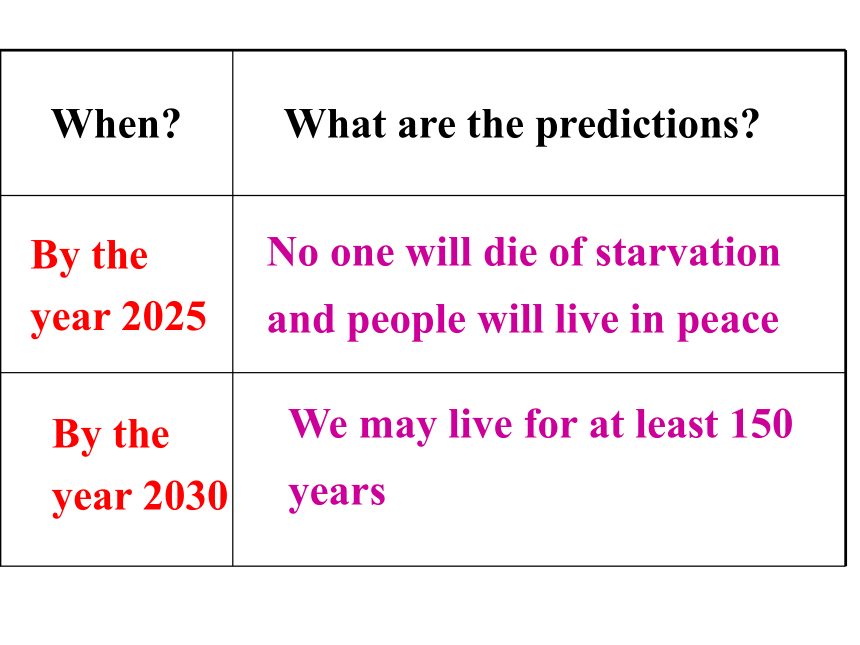
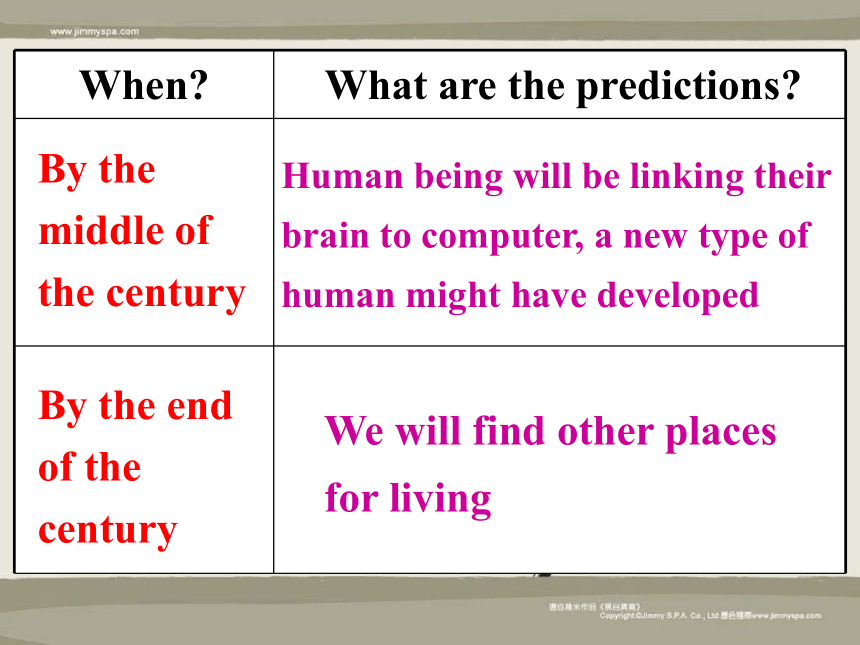
文档简介
课件42张PPT。Unit 20 lesson1
Futurology Are you interested in thinking about the future?
What do you think the future will be like? Predict it.Warm up Car will fly in the sky Robots will work for us even take place of our human beings.We will travel to the moon or live there .Even to other planets.skimmingRead the text and choose the best title :
a) From the Past to the Future
b) The Future Business
c) Tomorrow's World
d) A Perfect Future?readingWe are interested in predicting future, and so does Hannah Jones. Read the text again and find out why the writer is interested in futurology?How many predictions did the writer find? Read the text and complete the table.Very soonBy the year 2015Use our voice to give instructions to computersProduce a new type of clothing material that will remain stainless and never get old and wornBy the year 2025No one will die of starvation and people will live in peaceWe may live for at least 150 yearsBy the year 2030By the middle of the centuryBy the end of the centuryHuman being will be linking their brain to computer, a new type of human might have developedWe will find other places for living1. latter
(1). adj. : near to the end of a period Language pointseg: She spent the latter part of her life alone. 他孤独地度过了她的后半生。 (2). the latter
pron. : the second of two things or people already mentioned 已提及的两者中的后者 Many support the former alternative, but personally I favor the latter. 很多人赞成前一种方法,但我个人喜欢后一种 Latter 和later很容易混淆。later 可以作形容词用,意思是“以后的,较晚的时候”或“更新的”The launch was postponed to a later date. 发射延迟了。 In his later years of life, he devoted himself to the career of charity.晚年,他投身于慈善事业 later 还可以作副词,意思是“以后,后来”
eg: Two years later he became a soldier.
两年后他当兵了.
Later, his theory proved to be right.
后来,结果证明他的理论是正确的。② In terms of natural resources it is one of the poorest countries in Western Europe. 从资源的角度来说,它是西欧最贫乏的国家之一。2. In terms of 就……来说,从……的角度
① In terms of money, we’re quite rich, but not in terms of happiness.
就钱而言,我们很富有,但就幸福而言就不了。3. amount 量,数量(可数,多和不可数名词一起用)
A large amount of damage was done in a very short time.
片刻时间就造成了大量损失。
Large amounts of money were spent on the bridge
很多钱都花在这座桥上。
die of + 内因
die from + 外因疾病,cancer, illness, disease die of + joy, fear, disappointment, grief, old age, hunger, cold
die from + accident, wound, disease, overwork, carelessness, some unknown cause carry out
They swore an oath to carry out their duties faithfully.
We’ll carry out the investigation as soon as possible.
Custom officers carry out spot check on incoming car.
5. develop
① 发展,壮大
She developed the company from nothing. 她白手起家办起了这个公司。② 研制, 开发
The company develops and markets new soft ware.
这个公司开发并销售新软件。
③ 加强, 增强, 发挥
Their relationship has developed over a number of years.
多年来他们的友谊日益深厚。④ 修建, 开发
The site is being developed by a French company.
这块地正由一家法国公司开发利用。
⑤ 冲洗胶片
I had the film developed yesterday.
我昨天把胶片拿去冲洗了。6. beat
① 赢,打败
He beat me at chess.
他下棋赢了我。
② 避免,逃避
If we go early we should beat the traffic.
我们早点出发就会避开交通拥挤。③ 碰撞,击打
At that time, children were regularly beaten for making mistakes.
那个时候,孩子们经常因为犯错误挨打。
④ 更好
Nothing beats home cooking.
什么也比不上家里做的饭好吃。7. instructions 指示, 命令(多作复数)
They had received instructions to watch him.
他们已经接到监视 他的命令。
Very soon all of us are going to use our voices to give instructions to computers.
不久以后我们所有人就能通过说话对计算机发号施令。8. dawn (1). n. time of day when light first appears
黎明,破晓
We talked almost until dawn.
(2). v. begin to grow light 破晓
eg: It was dawning as we left.
我们离开时天就亮了。Grammar ---- future perfect &
future continuousa) Future Perfect
By the end of the century, we will have discovered other places in our solar systems.
b) Future Continuous
At nine o’clock on Saturday morning, I will be sitting in the front row and listening to the great Professor Willard.将来完成时态 表示动作或者状态延续到将来某一时间为止已有若干时间, 谓语动词常用延续性动词, 并常伴有for引导的时间段。
By the end of next year I will have lived here for ten years. The film will begin at 8:00. It will have been shown for half an hour when you arrive at 8:30.
When you come back, I will have been here for half an hour. 表示将来某个时间之前或另一个将来动作之前已经完成的动作, 常与by the time, when, before 等连用。谓语动词常用非延续性动词。
I shall have graduated from university by this time next year.
I guess you will have finished your homework when I come to see you.
When you return here, the new building will have been finished. 表示说话人对某一已经完成动作的推测。
The students will have finished reading the article now.
I think he will have got home so far. 将来进行时态 进行时态的用法:某一时间点正在发生的动作;或者某一段时间内一直发生的动作。
将来进行时态只不过把时间放在了将来, 所以将来进行时态表示将来某个时间点正在发生的动作或者将来某一段时间内一直在进行的动作。 I will be taking a shower at 9 o’clock tomorrow morning.
Catharine will be taking a part-time job in the next summer vocation.Complete these predictions about the world in 2020 by putting the verbs in brackets either in the Future Perfect or the Future Continuous.1. People (use) ____________ solar energy every daywill be using2. People (use) ____________ up all natural sources of oil.
3. People (travel) ______________ into space on a regular basis.
4. People (eat) ____________ only food created by specialists.
5. Traditional farms (disappear) ___________________will have usedwill be traveling will be eating will have disappeared6. Many new galaxies (discover) ______________________
7. Mars and Venus (explore) __________ ____________and (describe) ________ in detail
8. Scientists (study) _____________ the chance of people setting in other galaxiesbeen exploreddescribedwould havewill be studyingwill have been discovered Look at the programme of the
futurologists' conference and the
cues below(1-7). Write full sentence
using the Future Perfect or the
Future Continuous. 1. 5 p.m. on Friday- Prof Howard Green gives a lecture on alternative sources of energy.
At 5 p.m. on Friday, Prof Howard Green will be giving a lecture on alternative sources of energy.2. Saturday Lunchtime- the participants listen to two lectures.
By Saturday lunchtime, they will have listened to two lectures.
3. 2:30 p.m. on Saturday – everyone has lunch.
At 2:30 p.m. on Saturday, everyone will be having lunch.4. Saturday night- the participants have a reception.
On Saturday might, they will be having a reception.
5. Sunday morning- they identify a few problems of the future.
On Sunday morning, the participants will be identifying a few problems of the future.6. Sunday noon- the participants attend the closing ceremony.
At noon on Sunday they will be attending the closing ceremony. 7. The end of the seminar –the futurologists discuss many important issues.
By the end of the conference, the futurologists will have discussed many important issues.
Futurology Are you interested in thinking about the future?
What do you think the future will be like? Predict it.Warm up Car will fly in the sky Robots will work for us even take place of our human beings.We will travel to the moon or live there .Even to other planets.skimmingRead the text and choose the best title :
a) From the Past to the Future
b) The Future Business
c) Tomorrow's World
d) A Perfect Future?readingWe are interested in predicting future, and so does Hannah Jones. Read the text again and find out why the writer is interested in futurology?How many predictions did the writer find? Read the text and complete the table.Very soonBy the year 2015Use our voice to give instructions to computersProduce a new type of clothing material that will remain stainless and never get old and wornBy the year 2025No one will die of starvation and people will live in peaceWe may live for at least 150 yearsBy the year 2030By the middle of the centuryBy the end of the centuryHuman being will be linking their brain to computer, a new type of human might have developedWe will find other places for living1. latter
(1). adj. : near to the end of a period Language pointseg: She spent the latter part of her life alone. 他孤独地度过了她的后半生。 (2). the latter
pron. : the second of two things or people already mentioned 已提及的两者中的后者 Many support the former alternative, but personally I favor the latter. 很多人赞成前一种方法,但我个人喜欢后一种 Latter 和later很容易混淆。later 可以作形容词用,意思是“以后的,较晚的时候”或“更新的”The launch was postponed to a later date. 发射延迟了。 In his later years of life, he devoted himself to the career of charity.晚年,他投身于慈善事业 later 还可以作副词,意思是“以后,后来”
eg: Two years later he became a soldier.
两年后他当兵了.
Later, his theory proved to be right.
后来,结果证明他的理论是正确的。② In terms of natural resources it is one of the poorest countries in Western Europe. 从资源的角度来说,它是西欧最贫乏的国家之一。2. In terms of 就……来说,从……的角度
① In terms of money, we’re quite rich, but not in terms of happiness.
就钱而言,我们很富有,但就幸福而言就不了。3. amount 量,数量(可数,多和不可数名词一起用)
A large amount of damage was done in a very short time.
片刻时间就造成了大量损失。
Large amounts of money were spent on the bridge
很多钱都花在这座桥上。
die of + 内因
die from + 外因疾病,cancer, illness, disease die of + joy, fear, disappointment, grief, old age, hunger, cold
die from + accident, wound, disease, overwork, carelessness, some unknown cause carry out
They swore an oath to carry out their duties faithfully.
We’ll carry out the investigation as soon as possible.
Custom officers carry out spot check on incoming car.
5. develop
① 发展,壮大
She developed the company from nothing. 她白手起家办起了这个公司。② 研制, 开发
The company develops and markets new soft ware.
这个公司开发并销售新软件。
③ 加强, 增强, 发挥
Their relationship has developed over a number of years.
多年来他们的友谊日益深厚。④ 修建, 开发
The site is being developed by a French company.
这块地正由一家法国公司开发利用。
⑤ 冲洗胶片
I had the film developed yesterday.
我昨天把胶片拿去冲洗了。6. beat
① 赢,打败
He beat me at chess.
他下棋赢了我。
② 避免,逃避
If we go early we should beat the traffic.
我们早点出发就会避开交通拥挤。③ 碰撞,击打
At that time, children were regularly beaten for making mistakes.
那个时候,孩子们经常因为犯错误挨打。
④ 更好
Nothing beats home cooking.
什么也比不上家里做的饭好吃。7. instructions 指示, 命令(多作复数)
They had received instructions to watch him.
他们已经接到监视 他的命令。
Very soon all of us are going to use our voices to give instructions to computers.
不久以后我们所有人就能通过说话对计算机发号施令。8. dawn (1). n. time of day when light first appears
黎明,破晓
We talked almost until dawn.
(2). v. begin to grow light 破晓
eg: It was dawning as we left.
我们离开时天就亮了。Grammar ---- future perfect &
future continuousa) Future Perfect
By the end of the century, we will have discovered other places in our solar systems.
b) Future Continuous
At nine o’clock on Saturday morning, I will be sitting in the front row and listening to the great Professor Willard.将来完成时态 表示动作或者状态延续到将来某一时间为止已有若干时间, 谓语动词常用延续性动词, 并常伴有for引导的时间段。
By the end of next year I will have lived here for ten years. The film will begin at 8:00. It will have been shown for half an hour when you arrive at 8:30.
When you come back, I will have been here for half an hour. 表示将来某个时间之前或另一个将来动作之前已经完成的动作, 常与by the time, when, before 等连用。谓语动词常用非延续性动词。
I shall have graduated from university by this time next year.
I guess you will have finished your homework when I come to see you.
When you return here, the new building will have been finished. 表示说话人对某一已经完成动作的推测。
The students will have finished reading the article now.
I think he will have got home so far. 将来进行时态 进行时态的用法:某一时间点正在发生的动作;或者某一段时间内一直发生的动作。
将来进行时态只不过把时间放在了将来, 所以将来进行时态表示将来某个时间点正在发生的动作或者将来某一段时间内一直在进行的动作。 I will be taking a shower at 9 o’clock tomorrow morning.
Catharine will be taking a part-time job in the next summer vocation.Complete these predictions about the world in 2020 by putting the verbs in brackets either in the Future Perfect or the Future Continuous.1. People (use) ____________ solar energy every daywill be using2. People (use) ____________ up all natural sources of oil.
3. People (travel) ______________ into space on a regular basis.
4. People (eat) ____________ only food created by specialists.
5. Traditional farms (disappear) ___________________will have usedwill be traveling will be eating will have disappeared6. Many new galaxies (discover) ______________________
7. Mars and Venus (explore) __________ ____________and (describe) ________ in detail
8. Scientists (study) _____________ the chance of people setting in other galaxiesbeen exploreddescribedwould havewill be studyingwill have been discovered Look at the programme of the
futurologists' conference and the
cues below(1-7). Write full sentence
using the Future Perfect or the
Future Continuous. 1. 5 p.m. on Friday- Prof Howard Green gives a lecture on alternative sources of energy.
At 5 p.m. on Friday, Prof Howard Green will be giving a lecture on alternative sources of energy.2. Saturday Lunchtime- the participants listen to two lectures.
By Saturday lunchtime, they will have listened to two lectures.
3. 2:30 p.m. on Saturday – everyone has lunch.
At 2:30 p.m. on Saturday, everyone will be having lunch.4. Saturday night- the participants have a reception.
On Saturday might, they will be having a reception.
5. Sunday morning- they identify a few problems of the future.
On Sunday morning, the participants will be identifying a few problems of the future.6. Sunday noon- the participants attend the closing ceremony.
At noon on Sunday they will be attending the closing ceremony. 7. The end of the seminar –the futurologists discuss many important issues.
By the end of the conference, the futurologists will have discussed many important issues.
